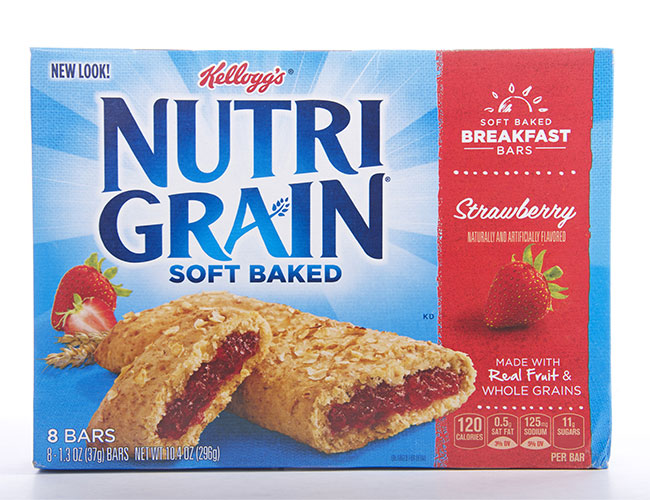
1. "Energy" Bars like Nutrigrain
While cereal bars and so-called "energy" bars may seem like a great, quick way to start your day off on the right foot when you're on the go, Dr. Lee warns that you shouldn't be duped by the many healthy-sounding labels that include words like "whole grains" and "real fruits." Oftentimes, these are just cover-ups for unhealthy ingredients. "It sounds healthy but if you look at the ingredient list, it is packed with processed things like sucrose, sugar, dextrose, carrageenan, soy lecithin, and corn syrup," she says, noting that Nutrigrain is one of the worst culprits. "Besides plenty of sugar, there are additives that are specifically used for food processing to keep ingredients together or give it the texture that we all expect." Yikes! Sometimes the easy way out just isn't worth the health consequences; try making a hearty bowl of oatmeal or whole grain toast instead.
2. Frozen meals like Lean Cuisine and Amy's
Frozen meals may be convenient, but what you save in time, you usually lose in nutrition. "Frozen foods/meals typically are high in fat, sodium, and calories. This may make it very difficult for someone to lose weight," Feder says. He tells us this is true even when it comes to seemingly "healthy" brands. "For example, Lean Cuisine's Sesame Chicken meal has 15 grams of sugar and almost 40% of your recommended daily sodium." Say it ain't so! That means that despite the fact that this company brands itself as better-for-you, low-calorie frozen food, it can actually be holding you back from your weight loss goals.
Organic food brand Amy's is another one to be wary of, Feder says. Just because these meals are organic, vegetarian, and may appear to be healthier than other options in the freezer aisle doesn't mean they're actually good for you. Take Amy's organic lasagna, for example. Feder points out that this meal contains 680mg of sodium and packs 500 calories into one small serving. At the end of the day, this just proves his point: "Just because it comes from a 'health' company, does not necessarily mean it will be healthy," he says. "Make sure to check those nutrition labels before you buy."
3. Store-bought sugary smoothies like Naked
Despite the reputation smoothies have for being a healthy breakfast option, that isn't always the case. While upping your daily fruit and veggie intake is always a great idea when you're trying to lose weight, the health benefits of store-bought smoothie drinks are often negated by an excess of added sugar. Dr. Lee uses Naked's Green Machine, which contains a shocking 53 grams of sugar, as an example. "As we read the ingredient list, some of the items are apple juice from concentrate or purees," she says. Believe it or not, that makes this smoothie "as bad as taking a can of coke." That's right: although this drink is marketed as healthy and "green," it offers virtually no nutritional value. The same goes for many juices and smoothies out there, which is why your best bet is always to make your own at home, using healthy, whole ingredients—and as little sugar as possible.
Of course, no diet is perfect, and at the end of the day, moderation is key. However, if you're eating these foods because you think they're healthy options, it's time to reconsider. All in all, remember your best bet is always to be an informed consumer by checking the label and keeping an eye out for those sneaky, processed ingredients. And whenever possible, remember to cook your own meals made with healthy whole foods.


